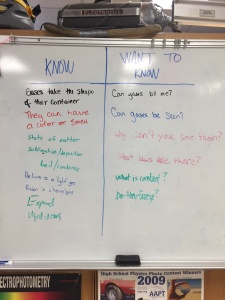We began the Gas Laws unit with a gallery walk preassessment to see how much, if any, knowledge the students had regarding the Kinetic Molecular Theory. All eight postulates of the theory were written on the white boards around the room. Students were grouped into pairs and given dry erase markers and asked whether or not they agreed with the written statements of:
- Gases are made up of really small particles.
- Gas molecules move in a straight line until they collide with something else.
- Gases occupy mostly empty space.
- The energy of a gas molecule has a direct relationship to the temperature of the gas.
- When they collide, gas molecules bounce off of each other.
- Gases with different chemical properties behave the same under specific conditions.
- Pressure, volume, temperature and amount are the most important variables in studying gas laws.
- There is one constant value that all gases share.
The student pairs were to discuss each postulate and then to write “agree” or “disagree” under it. All of the above postulates are true. Students then rotated around the room until all nine stations were visited, including a Know/Want to Know T-chart about gases. Afterward we discussed each postulate, and then asked for each side to defend their logic and reasoning as to why they agreed or disagreed with a statement. Most of the students had some experience with gas behavior and accurately predicted the outcomes, but others were surprised by some of the statements.

This activity was a great launchpad to bridge between gas laws and thermodynamics and to give me an idea of what knowledge students already possessed. It helped me activate prior student knowledge and plan for future instruction as well. Because of this, InTASCs 3 & 8 were best used to plan for and encourage a collaborative learning environment and HLP 13 was the basis for finding a way to open the discussion and transition between units.